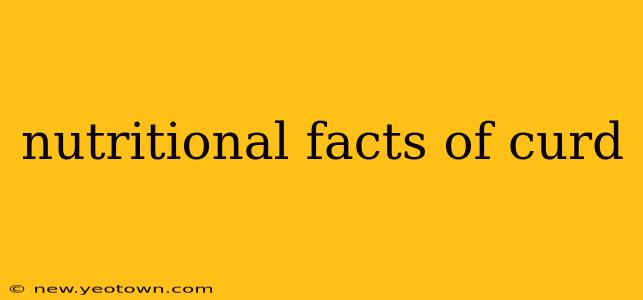Unraveling the Nutritional Powerhouse: A Deep Dive into Curd's Nutritional Facts
Curd, also known as yogurt, is more than just a delicious dairy product; it's a nutritional powerhouse packed with essential nutrients beneficial for overall health. From boosting your gut health to strengthening your bones, curd offers a surprising array of benefits. Let's delve into the detailed nutritional facts of curd, exploring its composition and the impact it has on your well-being.
This journey into the world of curd will answer many questions you might have, drawing on established research and expert opinions. Let's begin!
What are the main nutrients found in curd?
Curd is a rich source of several key nutrients. A typical serving (around 1 cup or 245 grams of plain, nonfat curd) provides a significant amount of protein, crucial for building and repairing tissues. It’s also an excellent source of calcium, essential for strong bones and teeth. Furthermore, curd contains various B vitamins, vital for energy production and maintaining a healthy nervous system. The specific amounts of these nutrients can vary based on factors like the type of milk used (whole milk, skim milk), the bacterial cultures used in fermentation, and any added ingredients like fruit or sweeteners.
How many calories are in a serving of curd?
The calorie content of curd varies depending on the fat content. Plain, nonfat curd generally contains around 150 calories per cup, while full-fat curd can contain significantly more, closer to 220 calories per cup. Adding fruits, sweeteners, or other ingredients will also increase the calorie count. Being mindful of the fat content and added ingredients allows for easy calorie management when incorporating curd into your diet.
Is curd a good source of protein?
Absolutely! Curd is an excellent source of high-quality protein, meaning it contains all nine essential amino acids our bodies cannot produce on their own. This protein contributes to muscle growth and repair, making curd an ideal addition to a balanced diet, especially for individuals engaged in physical activity. The protein content can vary slightly based on the type of milk used, but a serving generally provides a substantial amount of your daily protein needs.
What are the health benefits of eating curd daily?
The daily consumption of curd can offer a multitude of health benefits. Its high protein content aids in muscle building and satiety, potentially aiding weight management. The calcium contributes to bone health, reducing the risk of osteoporosis. Moreover, curd is a probiotic powerhouse, teeming with beneficial bacteria that improve gut health, aid digestion, and boost immunity. These friendly bacteria can help in preventing various digestive issues and contribute to a healthy microbiome. Research even suggests potential links between regular curd consumption and improved cardiovascular health, although more studies are needed in this area.
Is curd suitable for people with lactose intolerance?
This depends on the individual's level of lactose intolerance. Some individuals with mild lactose intolerance may tolerate curd better than milk because the fermentation process breaks down lactose, making it easier to digest. However, others with severe lactose intolerance might still experience symptoms even with curd. Greek yogurt, which has a lower lactose content due to the straining process, can sometimes be a better option for those with lactose intolerance. It's always best to consult a healthcare professional or registered dietitian for personalized dietary advice.
What are some creative ways to incorporate curd into my diet?
The culinary versatility of curd is truly remarkable! Beyond simply eating it plain, you can incorporate it into smoothies, dips, sauces, marinades, and baked goods. It can add creaminess and tang to both sweet and savory dishes. Consider adding it to your morning oatmeal, using it as a base for a healthy salad dressing, or incorporating it into your favorite curry recipe. The possibilities are endless!
In conclusion, curd is a nutrient-rich food with a wide range of health benefits. By understanding its nutritional composition and incorporating it creatively into your diet, you can reap the rewards of this versatile and wholesome food. Remember to choose plain, low-fat options to maximize benefits and minimize added sugar and calories.

